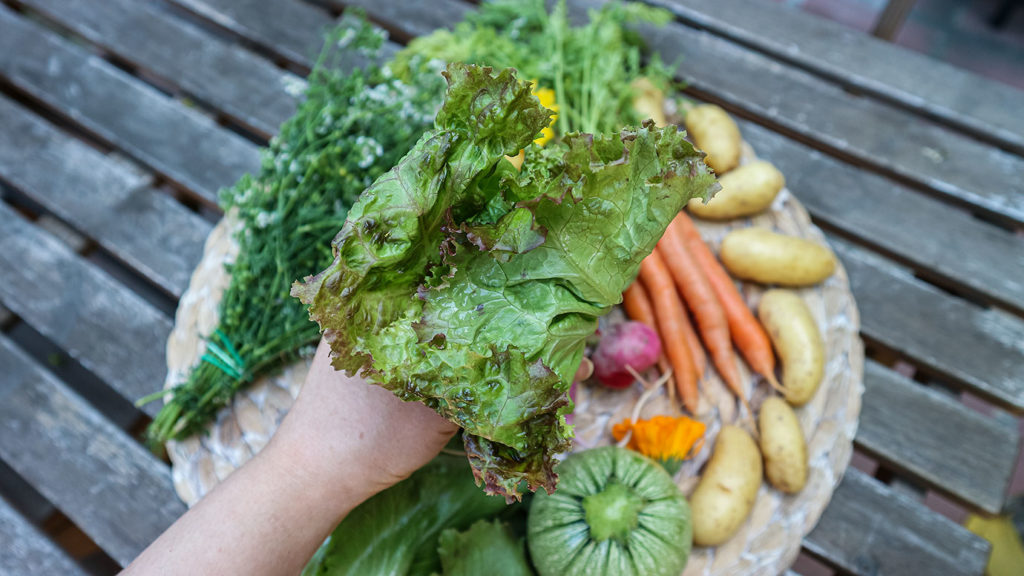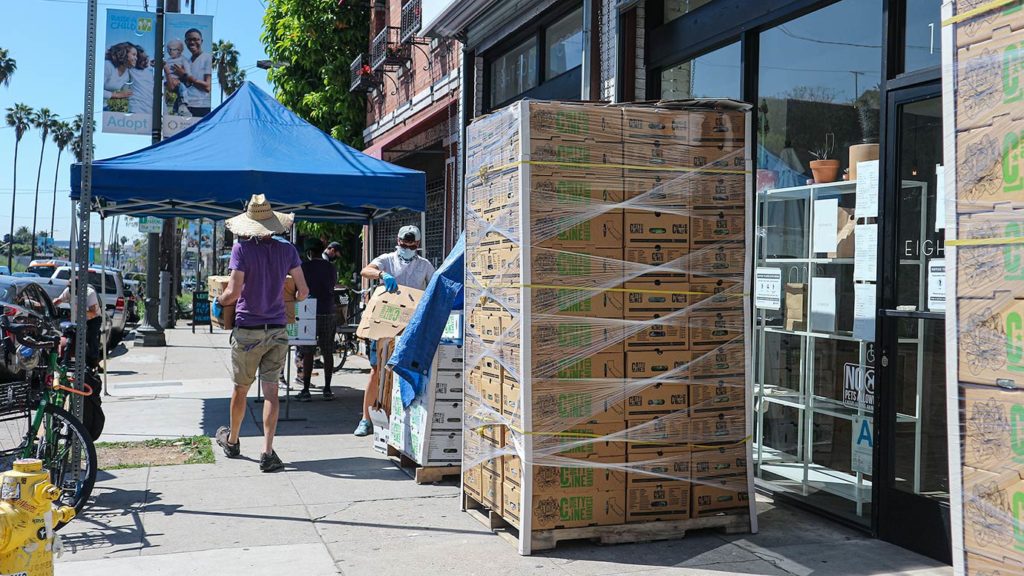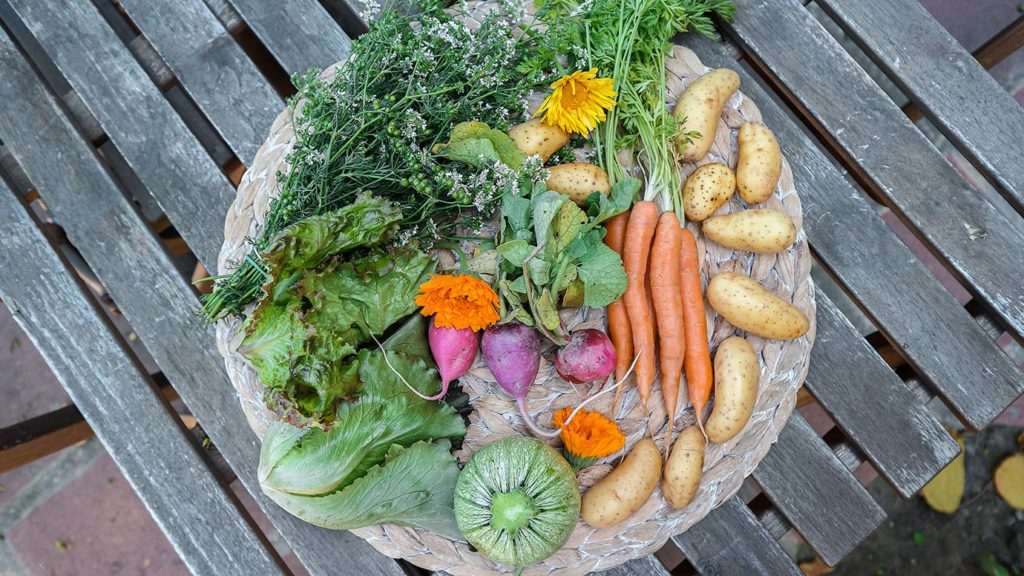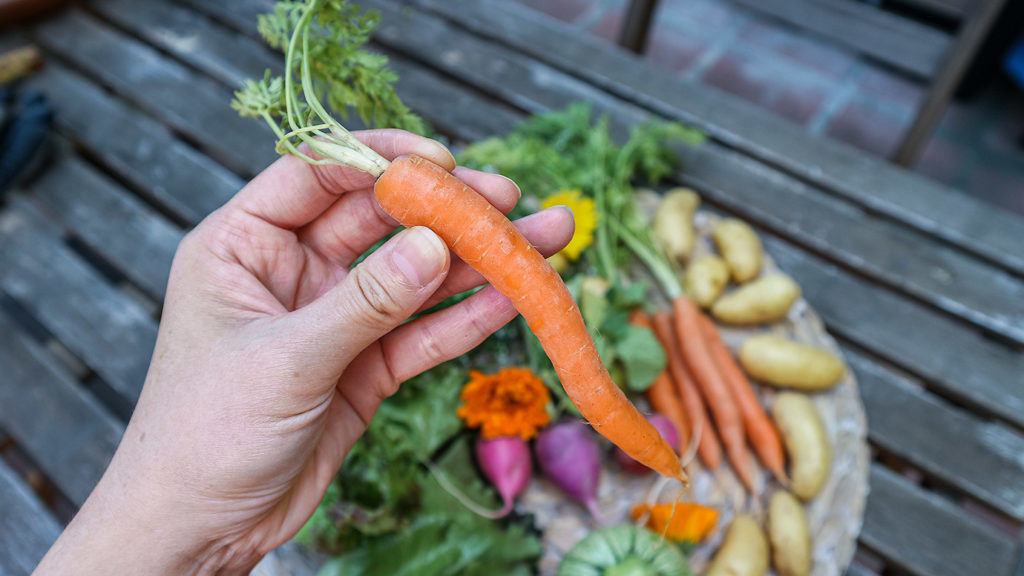
Megan Strom, co-owner of produce farm County Line Harvest, was at Gjusta in Venice waiting for Los Angeles-bound truck to arrive when she received a heartbreaking call. The truck had rolled on the highway while carrying 10 pallets of the farm’s produce boxes. The literal and metaphorical fruit of the back-breaking work her team had put into the last two weeks was now bruised and stranded along the 10 Freeway. Nearly 300 of their new CSA boxes wouldn’t make it to customers that day—a daunting prospect for a farm that had just worked tirelessly to offer them for the first time in its 20-year history.
That was March 20, the day after Los Angeles’s Safer at Home orders went into effect. But Strom had picked up hints that something wasn’t right weeks before.
David Retsky founded County Line Harvest in 2000 on six acres of land in Petaluma, located in Sonoma County. Strom joined in 2009 to plant roots in Thermal in Riverside County, where County Line now operates its second farm. Before the pandemic, the farm’s business was 90% dependent on distributors. It would sell its produce to high-end restaurants like Felix, Gjelina, Jon & Vinny’s, and M. Georgina as well as to tech campuses, cafeterias, and caterers.
On March 10, Strom received a cancellation order from one restaurant. At first, she thought nothing of it. Then, one of the farm’s biggest customers, Greenleaf out of San Francisco, canceled its entire order. This was the turning point for County Line Harvest’s bottom line.
“A switch just flipped for me, I thought, wow, we’ve got to do something,” Strom said.
For many businesses, the COVID-19 pandemic meant reliable earnings were abruptly uprooted without much warning. Some have shut down temporarily or indefinitely, while others were forced to pivot quickly just to stay afloat. County Line Harvest falls into the latter category. With restaurants across the country closed to dine-in service, the only way to move forward was to provide food directly to consumers.
Going Public in the Middle of a Pandemic
Strom brainstormed ideas with Deb Taylor, executive chef at Botanica in Silver Lake, who suggested selling a Community Supported Agriculture (CSA) box of mixed produce to the public from her restaurant. At that time, restaurants had just begun to pivot to sell grocery and pantry items out of their establishments.
Then, almost serendipitously, Gillian Ferguson from KCRW’s Good Food asked to interview County Line Harvest for Market Report, a segment that highlights local farms across California. Strom knew this was her chance to introduce the produce boxes to a large audience. She and her team sprang into action, scrambling to make the CSA boxes a reality before the interview.
Of course, this meant creating an entirely new product and connecting the small farm to the public for the first time. It also meant hiring more employees. Other than Strom and Retsky, the farm only had 35 harvest workers. Strom turned to her friends—part-time market workers and restaurant friends who found themselves suddenly unemployed—and offered them full-time work staffing distribution sites in L.A.
The team worked 18- to 20-hour days in those first two weeks before launch. They had to figure out how to pack the boxes, how to transport them to Los Angeles, and how to get them to customers.
For Strom, the transition meant an entirely new role. Before, she spent her days in the fields managing the daily harvest. Now, Retsky manages the harvest while Strom oversees the CSA boxes. She hasn’t set foot in the field in a month.

By launch day, the farm had sold all 1,500 of its boxes and rented an additional truck. Then Strom got that ill-fated call and she was devastated.
“It had 10 palettes of these CSA boxes in there. It felt like all our really hard work came to an end really, really quickly,” she said.
But community tends to be thickest in times of need. The Gjusta team offered to help rescue the boxes. And luckily, only five boxes were damaged.
This wasn’t the only time Strom was taken aback by how generous the food community in Los Angeles can be.
“It’s just been an amazing amount of support not only from the individual consumers but from all of these business partners that have stepped up in a really big way,” she said. “[From] Gjusta trying to rescue our produce from the truck accident to people [and] restaurants reaching out through Instagram that I had never met before.”
Eightfold Coffee in Echo Park was one of several businesses that messaged County Line Harvest through Instagram to offer up its location as a pickup spot. Now, the coffee shop is County Line’s busiest location, selling 1,000 CSA boxes per week.
Two months into the pandemic, County Line Harvest has become one of the most popular CSA boxes in Los Angeles. While many businesses are seeing a slowdown, County Line Harvest hired every employee back to full-time work in just 10 days.
“The process of packing all the boxes is more labor-intensive than what we were doing before. That provides enough work to definitely warrant the full-time schedule. The labor cost is definitely higher, but everybody is just happy to have the hours,” Strom said.
Strom says that the most time-consuming part is responding to the many emails that hit their inbox. Common questions include how to get a box, what’s in it, and if they can customize their box. The real challenge for the farm is coming up with a centralized form of communication, a way to warn people of changes and unforeseen incidents, like the rolled truck. That day left a few Angelenos angry and without a box of produce as promised. One woman, frustrated with the farm’s delayed response, retorted, “Tender Greens doesn’t have this problem.” But County Line Harvest is a much smaller operation than Tender Greens—and, luckily, most people seem to understand that.
“It’s just me and [Retsky] trying to oversee all of this. One hundred percent of our life energy has gone into this project. We don’t have a life outside of this. It’s been really reassuring how many people are understanding and patient with us,” Strong said.
For now, Strom and her team mostly communicate through Instagram. They post the latest updates, a peek inside the week’s boxes, and advice on how to cook various items. Customers also upload unboxing videos and photos of their produce or share recipes online.

Keeping Employees Safe
Although Strom is happy with public and industry support, her main concern is keeping the crew safe. While the nation depends on these essential workers to harvest food, growing concerns about farmworker safety have mounted nationwide from both workers and the public. Some workers reported that employers failed to implement safety measures or give them gloves and masks. While the CDC says the threat of contracting COVID-19 from food or food packaging is low, farmworkers are mainly concerned about passing it to each other and especially to elders in their families.
Lupe Sandoval, managing director of the California Farm Labor Contractor Association, advises farms to be diligent.
“We think that if you do what all the health experts have explained—if you can keep your social distance, if you can keep things sanitized, if you can keep sick people at home—we believe that people can work safely,” Sandoval told The Guardian.
Strom has taken that advice to heart. Because many of County Line’s farmworkers don’t watch the news, the team holds tailgate meetings about the importance of wearing gloves and masks and social distancing. County Line’s once flexible policies have transformed into stern rules. Employees might be sent home for not wearing a mask or not staying six feet away from someone else. Even morning handshakes are forbidden.
Strom also broke the harvest crew into teams of five to six people. For example, those who ride to work together or share the same babysitter. This is Strom’s way of pinpointing which group to quarantine should an employee fall ill.
Beyond the farm, Strom stopped selling at farmers markets after staff said they felt safer at CSA pickup locations than the markets.
Life After Pandemic
When harvest season ends in July and after the dust of the pandemic has hopefully settled, Strom and her team will have a lot of reflecting and planning to do. For now, they can only afford to take things day by day. The present doesn’t allow even a minute for daydreaming about the future. But, Strom does want to make the CSA boxes a permanent part of County Line Harvet’s business.
“It has changed the way that we farm, what we are growing, and what we are able to harvest. Because we were selling to these distributors that were selling to really really high-end restaurants, a lot of [the quality control] was around aesthetics,” Strom said.
Many items that were perfectly fine to eat were rejected and turned into scrap because they were flawed in appearance. Integrating the CSA boxes into County Line’s business model will limit food waste. It’ll be worth it, but it won’t be easy. The current CSA boxes were nine months in the works, consisting of food they’d put in the ground back in August.
“We are farmers. We have to grow the food first. Our work is in preparing the soil, is in planting the seed, watering, weeding and nurturing the plant, and then the harvest. The packing is the very tail end of that process,” Strom said.

To find out more about County Line Harvest and to see a list of available produce with photos, visit its website here. County Line Harvest produce boxes are $40 for family size and $25 for original size. If you have the means, please consider adding a donation box to your order for $20, which will go to County Line’s restaurant partners to distribute to their employees.
Christina is the co-founder of We Like LA. She covers arts & culture, lifestyle, and food for the site. Christina is also the in-house photographer. When not working you can find her sipping on a spicy margarita or exploring something from the mid-century modern era. Follow her on Instagram @Chrissy.Stardust




